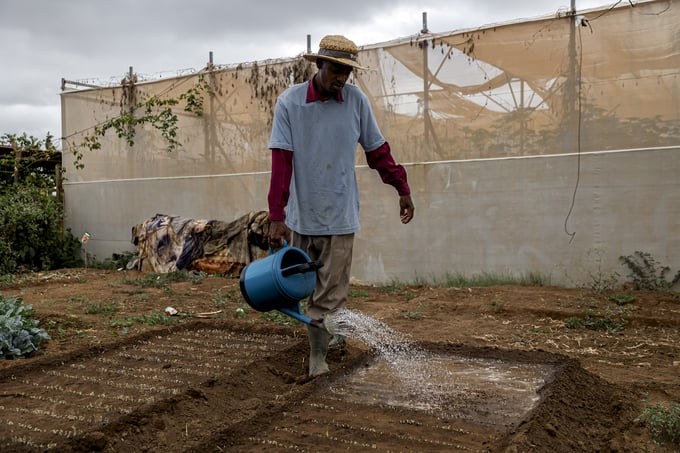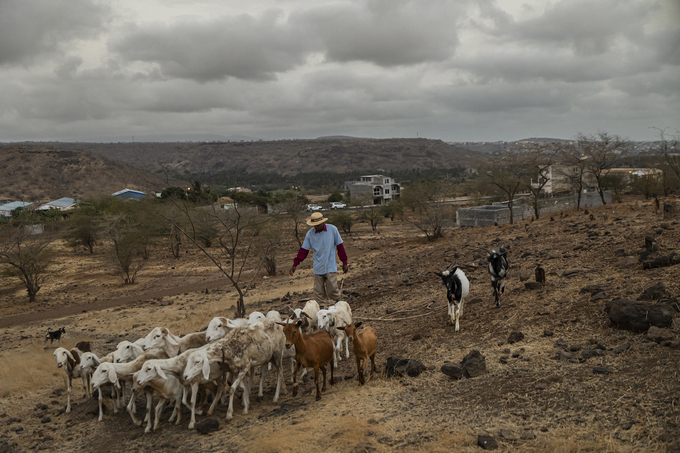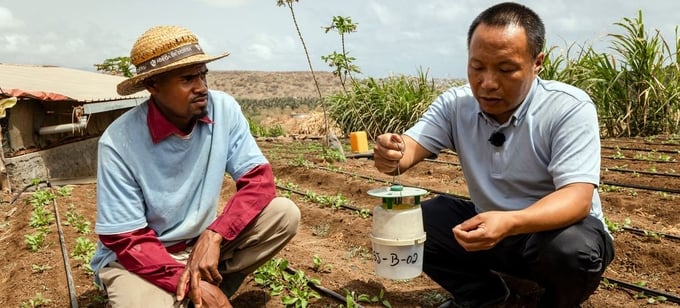May 19, 2025 | 04:54 GMT +7
May 19, 2025 | 04:54 GMT +7
Hotline: 0913.378.918
May 19, 2025 | 04:54 GMT +7
Hotline: 0913.378.918

Willy Gonçalves is a young farmer in Cabo Verde. Photo: FAO.
The Republic of Cabo Verde is an island nation in the central Atlantic Ocean. The country’s agriculture sector is significantly impacted by climate change, facing challenges such as land degradation and pest outbreaks. The dry seasons have become increasingly harsh in recent years, greatly affecting livelihoods and agricultural production.
In Cabo Verde, there are two seasons: the dry season and the rainy season. The dry season lasts for three months, with temperatures higher than usual. Freshwater becomes scarce due to the increasing salinity intrusion. The water reserves from the rainy season often run out by the end of the dry season, forcing people to spend a large amount of money to purchase freshwater. This water is obtained through desalination and is used for both daily living and irrigation. Like many other countries, Cabo Verde is experiencing rising temperatures and decreasing rainfall, making farmers increasingly reliant on various water sources, severely impacting their profitability.
From a young age, Willy Gonçalves developed a love for agriculture despite his family's difficult circumstances. Willy's father passed away when he was just four years old. His mother worked tirelessly, farming and caring for her six children. From an early age, Willy was close to the elderly neighbors, especially Nena, who inspired his passion for agriculture.
Now at 71, Nena has left the reins to Willy. He manages the farm, takes care of the land and finance, but Nena’s presence is still very much felt. She is everywhere on the farm, taking care of odds and ends, making food for the workers, overseeing all the activities with the confidence and authority of a woman who has dedicated her life to agriculture.
Willy beams when he talks of her, “She's always there for everyone who has a problem, from support for building houses to food for those who need it. They always speak highly of her. She's an example for me to follow, hard-working and respectful of everyone. Everything I learnt was from her.”
As he grew older, Willy decided not to pursue a university education. Instead, he stayed in his hometown to work with Mrs. Nena on developing local agriculture. Their passion and dedication caught the attention of the Ministry of Agriculture in Cabo Verde. Willy was invited to attend a course on soil management and pest control organized by the United Nations Food and Agriculture Organization (FAO). This program was part of the FAO's investment under the South-South Cooperation (SSC) framework.

Willy's passion and dedication caught the attention of the Ministry of Agriculture in Cabo Verde. Photo: FAO.
In 2017, an uncontrollable pest epidemic caused Willy's corn crop to fail completely. Fruit flies attacked the mangoes just as they were ready for harvest, not to mention the leaf miners damaging the tomato plants. These pests caused significant damage to crops across Cabo Verde. In response to the challenges posed by climate change, Cabo Verde requested assistance from the FAO. China was selected to support Cabo Verde in addressing this issue.
Through the project, Cabo Verdean farmers received technical support and technological solutions from China. Chinese agricultural experts visited many rural areas in Cabo Verde to share knowledge, transfer technology, and offer their experience based on long-standing, friendly cooperation.
Willy was enthusiastic about the project, as it allowed him to learn many new things. He shared, "It was a great help to me. It's the first time I've taken part in a training programme that talks about what we really need."
He recounted his experience with a Chinese agricultural engineer from the Ministry of Agriculture and Rural Affairs. Due to increasing soil degradation and saltwater intrusion, producers in Cabo Verde have had to strive to improve soil nutrient quality and restore natural resources.

Willy received technical support and technological solutions from Chinese expert. Photo: FAO.
Through this program, Willy enhanced his ability to identify and assess the causes of soil nutrient deficiencies and learned how to supplement nutrients from various sources to improve the soil. Previously, Willy had to purchase organic fertilizers, but now he can compost on his farm. He invested his savings in farm infrastructure rather than buying fertilizers.
After receiving the training, Willy worked to share his knowledge with the local community, helping to spread the initiatives within the framework of South-South Cooperation.
Expert Gilbert Silva, an engineer with the Plant Health Protection Organization of the National Institute for Agricultural Research and Development of Cabo Verde, remarked, "We hope to bring advanced agricultural techniques to farmers in Cabo Verde, applying scientific knowledge. Through this, farmers like Willy can be properly trained to face the increasingly severe challenges posed by pests. This is what we aim to achieve after the project concludes."
Translated by Quynh Chi

(VAN) Fourth most important food crop in peril as Latin America and Caribbean suffer from slow-onset climate disaster.

(VAN) Shifting market dynamics and the noise around new legislation has propelled Trouw Nutrition’s research around early life nutrition in poultry. Today, it continues to be a key area of research.

(VAN) India is concerned about its food security and the livelihoods of its farmers if more US food imports are allowed.

(VAN) FAO's Director-General emphasises the need to work together to transform agrifood systems.

(VAN) Europe is facing its worst outbreak of foot-and-mouth since the start of the century.

(VAN) The central authorities, in early April, released a 10-year plan for rural vitalization.

(VAN) Viterra marked a significant milestone in its carbon measurement program in Argentina, called Ígaris, reaching 1 million soybean hectares measured.